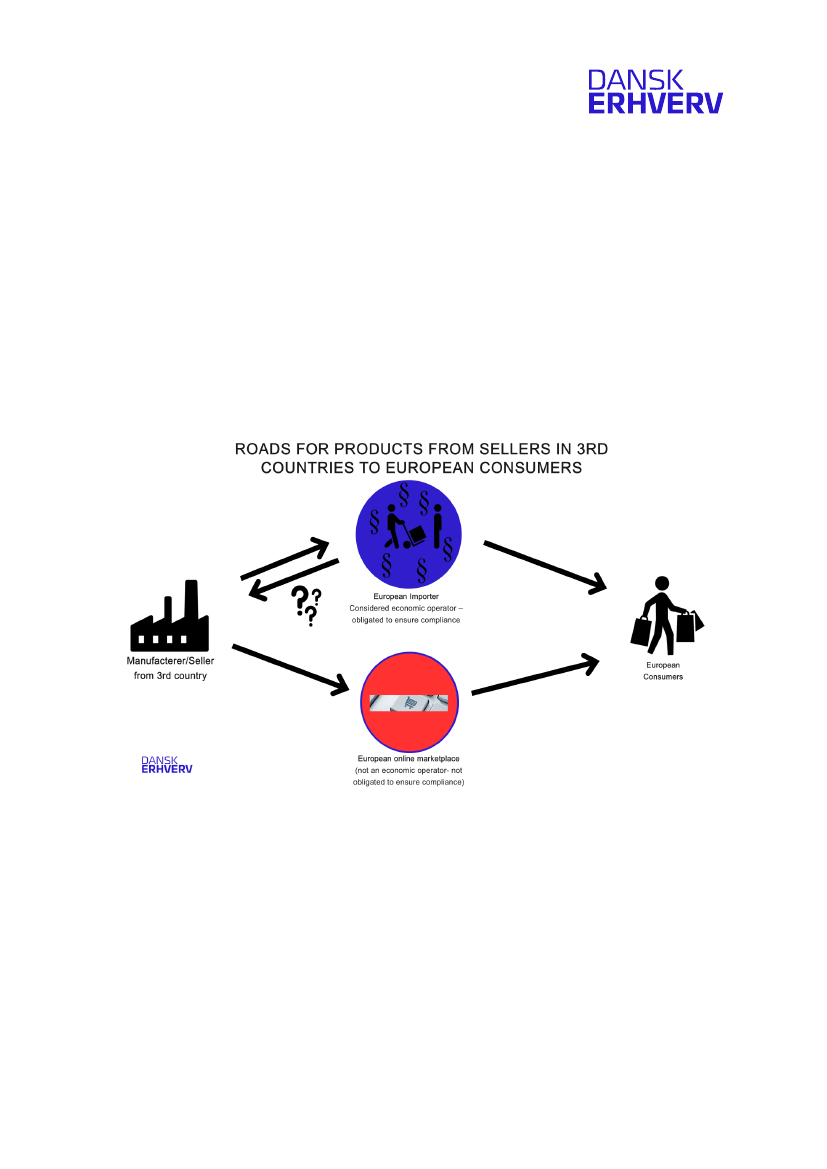Erhvervsudvalget 2024-25
ERU Alm.del Bilag 23
Offentligt
DANISH CHAMBER OF COMMERCE
Børsen
1217 Copenhagen
www.danskerhverv.dk
info@danskerhverv.dk
T. + 45 3374 6000
Online Marketplaces and products from
sellers in 3
rd
countries
24 September 2024
Page 1/8
ERU, Alm.del - 2024-25 - Bilag 23: Dansk Erhvervs opsummerende notat om udfordringen med onlinemarkedspladser, herunder Temus, formidling af produkter for sælgere i tredjelande til danske og europæiske forbrugere
DANISH CHAMBER OF COMMERCE
Background
In recent decades, e-commerce has grown explosively.
The Nordic countries were the first European countries to discover and act on the growing con-
sumer interest in e-commerce.
On that basis a tradition where individual brands, stores and retail-chains run their own web-
shops, where created; usually the webshop mirrors what can be found in their physical stores.
In other countries the webshop-culture might not have been as widespread as early as in the Nor-
dics. Therefore, companies, in for example Germany and Southern Europe, have made extensive
use of primarily Amazon's online marketplace to sell their products.
Amazon was already large in these markets when the appetite for e-commerce really took off, par-
ticularly during Covid-19. Online marketplaces have been a tool for these and smaller businesses
to reach consumers without having their own webshop.
What is an online marketplace?
An online marketplace is a platform where a business can sell its goods in a showcase/on the plat-
form, while the sales agreement is made between the business-seller and the consumer. The
online marketplace (the platform) is essentially a meeting place connecting businesses and con-
sumers
1
.
Online marketplaces can be a safe place and a tool to make competition efficient
When it comes to selling goods and reaching out to consumers online, marketplaces are an excel-
lent tool, that promotes businesses and makes competition more efficient by giving consumers a
wide range of choices on one platform. Smaller companies can reach many consumers without
opening their own webshop.
Moreover, there is no critical regulatory challenge concerning consumer protection, product
safety or environmental regulation when dealing with products sold by EU businesses to EU con-
sumers.
These products and their packaging are subject to either importer or manufacturer responsibility,
which can be enforced by national enforcement authorities in EU member states.
Zalando is an example of an online marketplace that only facilitates products manufactured in or
imported into the EU.
When is an online marketplace undermining the internal market and the green
transition?
The challenge arises when an online marketplace, such as Amazon, Shein, Temu, LightInTheBox,
etc. facilitate the sale of goods to EU consumers on behalf of sellers based in 3
rd
countries, such as
China, India, Bangladesh etc.
‘Online marketplace’ is defined in the Digital Services Act (regulation 2022/2065) as “a provider of online platform allowing
consumers to con-
clude distance contracts with traders”
1
Page 2/8
ERU, Alm.del - 2024-25 - Bilag 23: Dansk Erhvervs opsummerende notat om udfordringen med onlinemarkedspladser, herunder Temus, formidling af produkter for sælgere i tredjelande til danske og europæiske forbrugere
DANISH CHAMBER OF COMMERCE
In these situations, there are currently no regulations ensuring that there is a business in the EU
that is responsible for ensuring that the products are legal under EU law before the products are
sold.
The loophole exists because the regulation on product safety and environmental regulation have
failed to bring the legislation into a digital time period and has kept the same definitions of terms
like “placed on the market”, “making available”, “economic operators”, “importer” etc. as
has been
applied for decades.
E.g. Article 11 in General Product Safety Regulation (GSPR) states
“Before placing a product on
the market, importers shall ensure that the product complies with the general safety require-
ment laid down in Article 5 and that the manufacturer has complied with the requirements set
out in Article 9(2), (5) and (6)[…]”
In relation to environmental protection and circular economy, the new Ecodesign Regulation (ESPR)
stipulates in Article 29 that
“importers shall, with regard to products covered by a delegated act
adopted pursuant to Article 4, only place on the market products that comply with the requirements
set out in the applicable delegated acts”.
A commercial importer of goods has the obligation to ensure that the products are legal
before
the products are put up for sale
–
whether the sale happens physically or online.
However, due to the lack of recognition of online marketplaces as economic operators (commer-
cial importers) the products that are facilitated between sellers in 3
rd
countries and EU consumers
through online marketplaces are not considered to be imported into the EU by a company, and
thus the products and packaging are not captured by the system that has been built-up over 50
years in the EU. The consumer is in this case considered to be the importer.
What have we worked for until now?
Since approx. 2017, the Danish Chamber of Commerce has worked intensively to ensure that
online marketplaces, which position themselves commercially as intermediaries between sellers
in 3
rd
countries and EU consumers, are regulated on an equal footing with businesses that import
goods from sellers and manufacturers in 3
rd
countries.
On this basis, we, together with the Danish Consumer Council (Tænk), the European Consumer
Organization BEUC, and Toy Industries of Europe proposed, during the discussion and adoption
of the Digital Services Act (DSA), that the two business models should be equalized.
The EU has granted the highest consumer and environmental protection in the world for decades
and has recently set out great ambitions for a green transition. Already at the time before the pro-
posal for the DSA we saw a significant risk that we would end up in a situation where the internal
market in the EU would be undermined.
Therefore, we argued that an online marketplace that facilitates products from sellers in 3
rd
coun-
tries to EU consumers needs to bed defined as an economic operator with proactive obligations of
ensuring compliance of the products from 3
rd
countries and as such on an equal footing with tra-
ditional trading companies.
Unfortunately, the EU legislators did not follow our suggestion.
Despite support from MEP Christel Schaldemose, who served as the rapporteur for the proposal
in the European Parliament, and support from all parties in the Danish parliament and Danish
government, the result was that online marketplaces were granted almost the same exemptions
from proactive obligations and liability as Facebook, Twitter, and other platforms that facilitate
Page 3/8
ERU, Alm.del - 2024-25 - Bilag 23: Dansk Erhvervs opsummerende notat om udfordringen med onlinemarkedspladser, herunder Temus, formidling af produkter for sælgere i tredjelande til danske og europæiske forbrugere
DANISH CHAMBER OF COMMERCE
content rather than physical products. The latter platforms obviously need to be regulated under
consideration of values such as freedom of speech and expression. These values are not relevant
to consider when it comes to distribution of physical products.
Why can the challenge with non-compliant products and packaging not be solved
by enforcing the DSA?
While the DSA deals relevantly with classic consumer legislation, e.g. rules on advertising, mis-
leading of consumers etc. in relation to online marketplaces, it fails to deal relevantly with the is-
sue on distribution and supply of products from 3
rd
countries to European consumers through
online marketplaces.
Rules on advertising and misleading of consumers relate to commercial communication which is
a sort of immaterial content in the same category as other immaterial contents such as text, audi-
ovisual or visual content. The content itself can do no physical harm to either the consumers or
the environment.
Rules on product safety and environmental issues on the other hand relate to the compliance of
physical products and the protection of consumers and environment. Negligence of the proactive
obligations in product safety or environmental regulation can be harmful as soon as the products
or packaging are in the hands of a consumer or become part of a recycling process.
The fundamental principle in the DSA is that the platforms, including online marketplaces, cov-
ered by the DSA have a shield against liability and a right to invoke a
“no obligation to monitor”.
This “no obligation to monitor”
that the platforms (including the online marketplaces) have been
granted, runs diametral contra to the obligation of importers and other economic operators to en-
sure the compliance of products from 3
rd
countries
before
the products are placed on the EU mar-
ket.
There is in fact a fundamental obligation in the product and environmental regulation to monitor
the compliance of the products and packaging before they are sold. A fundamental principle that
the product safety and environmental legislation that regulate the distribution of products and
packaging to Europe is based on.
Further
–
in relation to subject of responsibility - the EU product safety and environmental pro-
tection system is built on a principle that there shall always be a company (an economic operator)
in the EU that can be held responsible for having ensured that products sold commercially to EU
consumers are legal, safe and compliant with EU law, before they are sold.
This principle is undermined by not regulating online marketplaces as economic operators with
proactive obligations in relation to the compliance of products and packaging.
This is the reason why we consider the regulation of online marketplaces as part of the DSA to be
a mistake, when it comes to obligations in relation to product safety and environment. The minor
adjustments that have been made in the DSA especially for online marketplaces, e.g. in article 31
do unfortunately not solve the challenge.
Why does it not solve the challenge that there are strict rules on VLOPs in the
DSA?
Both from the Commission and from other angles reference is made to the strict rules on Very
Large Online Platforms (VLOPs) when solutions of the challenge of TEMU, Shein etc. are dis-
cussed.
Page 4/8
ERU, Alm.del - 2024-25 - Bilag 23: Dansk Erhvervs opsummerende notat om udfordringen med onlinemarkedspladser, herunder Temus, formidling af produkter for sælgere i tredjelande til danske og europæiske forbrugere
DANISH CHAMBER OF COMMERCE
However, application of those rules requires that the online marketplace has more than
45.000.000 users pr. month in the EU. Very few online marketplaces meet that requirement.
The fact is that any existing webshop that today have suppliers of products and packaging from
3
rd
countries and which the webshop will need to ensure complies with the EU legislation on
product safety and environmental protection, will be able to transform their webshop into an
online marketplace.
In that case the only difference would be that the consumer enters into the contract with the sup-
plier from the 3
rd
country instead of the webshop
–
now online marketplace
–
and the webshop
(now online marketplace) will be covered by the DSA instead of the importer responsibilities in
the product and environmental regulation. And as such the webshop (now online marketplace)
would not need to spend resources on ensuring compliance of the products and packaging before
it is sold.
What has happened on the commercial market after the adoption of the DSA?
Shortly after the adoption of the DSA, Temu stormed the European market. With the dominance
Temu has gained
2
, and the low degree of compliant products found on Temu, it is clear that there
remains a need to equalize online marketplaces and economic operators, e.g. importers in terms
of proactive responsibility for the compliance of the products and packaging entering the EU from
3
rd
countries.
Several analyses show that Temu is now the second most-used e-commerce facility among Danish
consumers.
Furthermore, according to the European retail organization EuroCommerce, the number of pack-
ages sent to the EU via online marketplaces has increased tenfold in just a few years, from 400
million to approximately 4 billion annually.
It is important to note that most of the online marketplaces used by Danish and European con-
sumers are in fact established in the EU. This is the case for Temu, Amazon, Shein, Wish, etc.
Therefore, it would practically not be an issue to regulate them in the same way as European im-
porters of products from 3
rd
countries and to also enforce the obligations against them.
Consequences of not introducing more proactive obligations for online market-
places facilitating products and packaging to EU consumer
The huge amount of non-compliant products facilitated by online marketplaces, like Temu, on be-
half of sellers in 3
rd
countries constitutes a problem and a risk for consumers
3
.
2
Since its launch in September 2022, Temu has become one of the most popular marketplaces globally in a relatively short period of time: Statista
states that the number of visits to Temu amounted to around 668.2 million in July 2024. The number of visits increased by around 20 percent
compared to the previous month,
https://de.statista.com/statistik/daten/studie/1387811/umfrage/anzahl-der-visits-pro-monat-von-temu/
Analysis from the Danish Chamber of Commerce shows that in June 2024 Temu is the second largest online marketplace in Denmark:
https://www.danskerhverv.dk/presse-og-nyheder/nyheder/2024/juni/nye-tal-om-temu-vakker-opsigt-det-er-simpelthen-uhort/
3 The Danish Consumer Council (Tænk), August 19th 2024: https://taenk.dk/forbrugerliv/elektronik-og-digitale-tjenester/undersoegelse-varer-
fra-temu-fejler
Toy Industries of Europe (TIE), February 20th 2024: https://www.toyindustries.eu/95-of-toys-bought-from-new-online-platform-break-eu-
safety-rules/
Toy Industries of Europe (TIE), June 17th 2020: https://www.toyindustries.eu/ties-eu-toy-safety-report-the-problem-of-unreputable-sellers-on-
online-marketplaces/
Page 5/8
ERU, Alm.del - 2024-25 - Bilag 23: Dansk Erhvervs opsummerende notat om udfordringen med onlinemarkedspladser, herunder Temus, formidling af produkter for sælgere i tredjelande til danske og europæiske forbrugere
DANISH CHAMBER OF COMMERCE
For example, toys, cosmetics, and electronics can be directly dangerous to consumers due to haz-
ardous substances or poor construction.
Further, all the European companies that are
–
opposite online marketplaces
–
categorized as
economic operators and as such have a number of proactive obligations in the product safety and
the environmental regulation, are subject to a distortive competitive situation. This unfair situa-
tion makes the companies less effective and harms the opportunities to compete on an interna-
tional level.
Last but not least, the negligence of categorizing online marketplaces as economic operators and
such as part of the supply chain has significant consequences for the green transition and the ef-
fects of the Green Deal. The impact of the new green legislation risks being undermined when
such a large portion of the products and packaging entering the EU are not connected to an eco-
nomic operator, that is responsible for proactively ensuring the compliance of products or pack-
aging.
Suggestions for solutions (in short)
Main initiatives required
Online marketplaces that facilitate the sale of products from sellers and factories in 3
rd
countries
to EU consumers must be categorized as economic operators and as such treated the same way as
importers of products and packaging from 3
rd
countries.
The online marketplaces that facilitate products from sellers in 3
rd
countries must have the same
proactive responsibilities as importers for ensuring that the products or packaging comply with
EU law before products or packaging are put up for sale in the EU.
This can be achieved through two models:
1) An omnibus regulation defining the obligations of online marketplaces that facilitate the
sale of products from sellers or factories in 3
rd
countries so that their obligations match
those of importers. An omnibus regulation is a regulation that changes a large number of
regulations or directives at once. This omnibus regulation should cover all product safety
and relevant environmental laws.
2) The adoption of a new section in the Digital Services Act that introduces these proactive
obligations for online marketplaces regarding the sale of products from sellers and facto-
ries in 3
rd
countries to EU consumers.
Additional initiatives to help level the playing field
Elimination of the Customs threshold
To counter the competitive advantage that online marketplaces from 3
rd
countries achieve by pric-
ing products below the EU customs threshold, the threshold should be completely removed.
This would ensure that all products, regardless of value, are subject to the same customs rules.
The online marketplaces should be responsible for paying customs duty. If the customs duty is
not paid, the goods cannot be released from customs.
Furthermore, online marketplaces should be required to document to customs authorities that
the products are legal before they can be released from customs. This is also a requirement for im-
porters of products from third countries.
Page 6/8
ERU, Alm.del - 2024-25 - Bilag 23: Dansk Erhvervs opsummerende notat om udfordringen med onlinemarkedspladser, herunder Temus, formidling af produkter for sælgere i tredjelande til danske og europæiske forbrugere
DANISH CHAMBER OF COMMERCE
This work should be addressed in connection with the ongoing negotiations on the EU Customs
Code.
Some online marketplaces have already argued that they would happily accept to have more fi-
nancial obligations whereas they refuse to accept proactive obligations that would require them to
staff up on the compliance department.
However, it is very important to be aware that the ambitions in the EU to be frontrunners on the
green transition and ensure a high level of consumer protection can only be fulfilled, if the online
marketplaces are met with the same obligations as already imposed on traditional trade compa-
nies.
Blocking of Online Marketplaces
In order to ensure the effectiveness of the above-mentioned proposals, it would be natural to
adopt connected legislation that allows for a cross-Europe blocking of the access to online mar-
ketplaces that predominantly facilitate products or packaging that do not comply with EU law.
Page 7/8
ERU, Alm.del - 2024-25 - Bilag 23: Dansk Erhvervs opsummerende notat om udfordringen med onlinemarkedspladser, herunder Temus, formidling af produkter for sælgere i tredjelande til danske og europæiske forbrugere
DANISH CHAMBER OF COMMERCE
Contact details
Betina Schiønning
Attorney
Head of product regulation and head of enforcement
M.: +4591373120
T.: +4533746152
BSC@DANSKERHVERV.DK
Page 8/8




